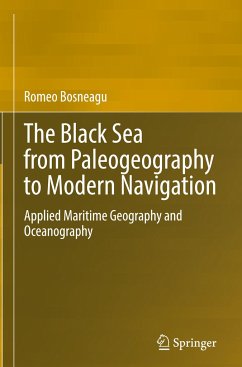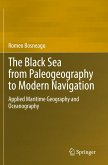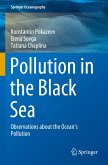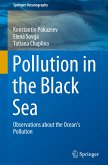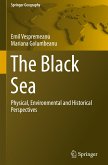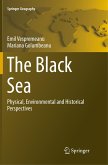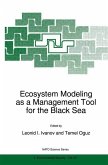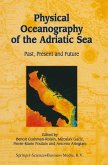This book provides an analysis of the evolution of navigation and seaborne trade in the Black Sea, considering the geographic, geological, and hydro-meteorological data, including information from the historical, geopolitical, economic, social, and military frames.
In ancient times the Black Sea was at the edge of the known world, and together with its coasts it preserves traces of the Greek, Roman, and Byzantine civilizations. Many of the ancient ports were important and essential towns, which remains the case in modern times.
The complex geographical conditions that have historically influenced, and continue to influence the development of maritime trade and transport in the Black Sea, have not been thoroughly researched or optimized for these activities.
The book is divided into ten chapters. Chapter I describes the physical - geographical conditions of the Black Sea's basin, and the geological evolution of its recent history, with application to the hypothesis of Noah's flood. Chapter 2 presents a short history of the research conducted on the Black Sea upto present day. Chapter 3 summarizes the specific characteristics of the Black Sea's morphohydrography and morphodynamics. Chapter 4 contains the conclusions regarding the influence of coastal relief on the navigation and seaborne trade on the Black Sea. Chapter 5 analyzes the Black Sea basin's meteo-climatic regime. Chapter 6 contains the conclusions of the influence of weather and climate factors on the navigation and seaborne trade on the Black Sea. Chapter 7 describes the specific hydrological factors of the Black Sea. Chapter 8 contains the conclusions regarding the influence of the hydrological factors for the navigation and seaborne trade on the Black Sea. Chapter 9 presents the Black Sea's specific hydrobiological elements specific, as a "unicum hydrobiologicum", and the main features of the Black Sea's ecology. Chapter 10 is concentrated on the historical, social, political, economic, and geopolitical framework of the Black Sea basin influencing navigation and maritime transportation, from ancient times to the present.
The book is written from the perspective of a Romanian Navy officer, with more than 40 years' experience in the Romanian Navy
In ancient times the Black Sea was at the edge of the known world, and together with its coasts it preserves traces of the Greek, Roman, and Byzantine civilizations. Many of the ancient ports were important and essential towns, which remains the case in modern times.
The complex geographical conditions that have historically influenced, and continue to influence the development of maritime trade and transport in the Black Sea, have not been thoroughly researched or optimized for these activities.
The book is divided into ten chapters. Chapter I describes the physical - geographical conditions of the Black Sea's basin, and the geological evolution of its recent history, with application to the hypothesis of Noah's flood. Chapter 2 presents a short history of the research conducted on the Black Sea upto present day. Chapter 3 summarizes the specific characteristics of the Black Sea's morphohydrography and morphodynamics. Chapter 4 contains the conclusions regarding the influence of coastal relief on the navigation and seaborne trade on the Black Sea. Chapter 5 analyzes the Black Sea basin's meteo-climatic regime. Chapter 6 contains the conclusions of the influence of weather and climate factors on the navigation and seaborne trade on the Black Sea. Chapter 7 describes the specific hydrological factors of the Black Sea. Chapter 8 contains the conclusions regarding the influence of the hydrological factors for the navigation and seaborne trade on the Black Sea. Chapter 9 presents the Black Sea's specific hydrobiological elements specific, as a "unicum hydrobiologicum", and the main features of the Black Sea's ecology. Chapter 10 is concentrated on the historical, social, political, economic, and geopolitical framework of the Black Sea basin influencing navigation and maritime transportation, from ancient times to the present.
The book is written from the perspective of a Romanian Navy officer, with more than 40 years' experience in the Romanian Navy

